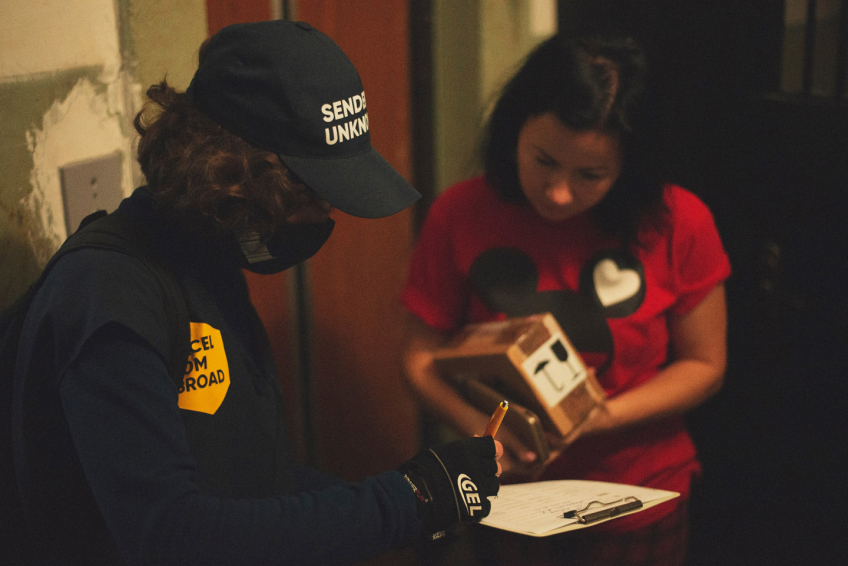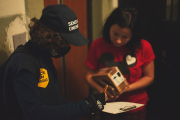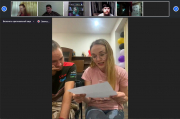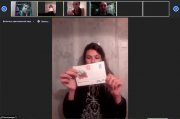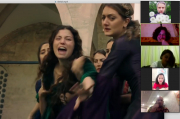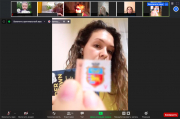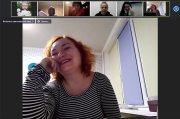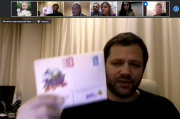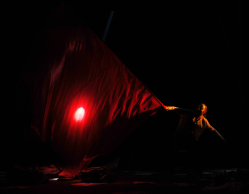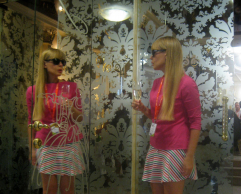Пандемія коронавірусу дала суттєвий поштовх для виходу театру в цифрову сферу. Це, між іншим, майже скасовує саму сутність театру власне як медіуму, який передбачає постійний взаємний контакт акторів і глядачів, драматургії й аудиторії, і, в цілому, – багаторівневого сприйняття. Втім, чи стане такий "театр майбутнього" чимось природним і що це означає? Бути де-факто всередині такої імерсивної дії, де межі між грою і специфічною суспільною комунікацією стерті? Чи щось інше?
"Sender unknown" – міжнародний проєкт, представлений Totem Centre Theatre Lab (Херсон), Futur3 (Кельн) і Молодіжною театральною студією (Бішкек). В ній глядач є також безпосереднім учасником. Першою сюжетною взаємодією у виставі (своєрідним першим актом) є комунікація глядача з кур'єром під час отримання посилки з невідомим вмістом. Це служить ключем для подальшої драматургії всередині зум-простору, де зустрічаються люди з різним досвідом і їм, по ходу подальшої взаємодії, доводиться відкривати для себе спочатку чужі наративи, а потім розкривати в тому чи іншому вигляді власні. Іноді ці наративи видаються наївно-щирими, але зараз і часи такі, коли "нова щирість" не здається чимось затертим. Але іноді вони самовикриваючі, вуайерістичні і ексбіціоністичні. Зум як простір театральної, партисипативної і перформативної взаємодії знижує фактор певної споконвічної авторської вибудуваності. Я / Ми – це драматурги, актори, судді і кати… Всі і ніхто.
"Sender unknown" викликає масу асоціацій з тим, як деякі актуальні європейські театральні діячі чи групи стали працювати з самим медіумом віртуальності як вимушеної в'язниці, лікарні або просто місця, куди нас кинули в ім'я порятунку здоров'я від палючого легені пекла коронавірусу. Можна згадати проєкт Штефана Кегі "9 movements" (Rimini Protokoll), де глядач запрошувався до участі у перформансі в жанрі site specific: там глядач сам був собі актором, драматургом, режисером, був як би частиною ієрархії і був над нею. "Sender unknown" володіє певною ієрархією на рівні зум-сесії з чітким порядком зачитування листів і рамкових ігор з предметами самими учасниками. Це дещо консервативний підхід, але тут варто уточнити головне – наш глядач ще не готовий до тотальної імерсивності до такої міри, щоб повністю позбутися цієї глибокої ієрархії.
Втім, "Sender unknown" характеризується не меншою часткою інтерактивності, ніж спектакль ізраїльських художників Ліора Залмансона і Маї Магнат "I don't want to see this». Хіба що замість тестів для майбутніх кандидатів в модератори Фейсбуку, як це було у Магнат-Залмансона – посилка як тригер, який розкриває фобії. Я, як безпосередній учасник сесії, вибрав для себе максимальну позицію відсторонення, спостерігача з боку, людини байдужої до загадкового вмісту посилки. (Мої особисті параноїдальні тригери зіграли тут свою визначальну роль.)
"Sender unknown" де-факто – це перший театральний проєкт, який вийшов з офлайну (прем'єра вистави була під час Gogolfest Dream в цьому році) в онлайн, не втративши нічого в плані наративного, хоча вибір героїв в листах і героїв для участі в зум-сесії здається як очевидним, так і чітко прорахованим, бо річ йде про апеляцію до надемпатії і сенситивного сприйняття Іншого – його досвіду, життя, особистості. Це дещо маніпулятивний, але достатньо ефективний хід, адже в умовах всесвітнього карантину всі ми повинні розділяти цей досвід Іншого, почавши проявляти на базових рівнях турботу про себе і оточуючих. Втім, цю перевірку наше суспільство (не тільки українське) провалило, побачивши у цих запобіжних заходах посягання на свої свободи. Однак посилка з невідомим вмістом – це ще й символ ящика Пандори, який, безумовно, для кожного свій.
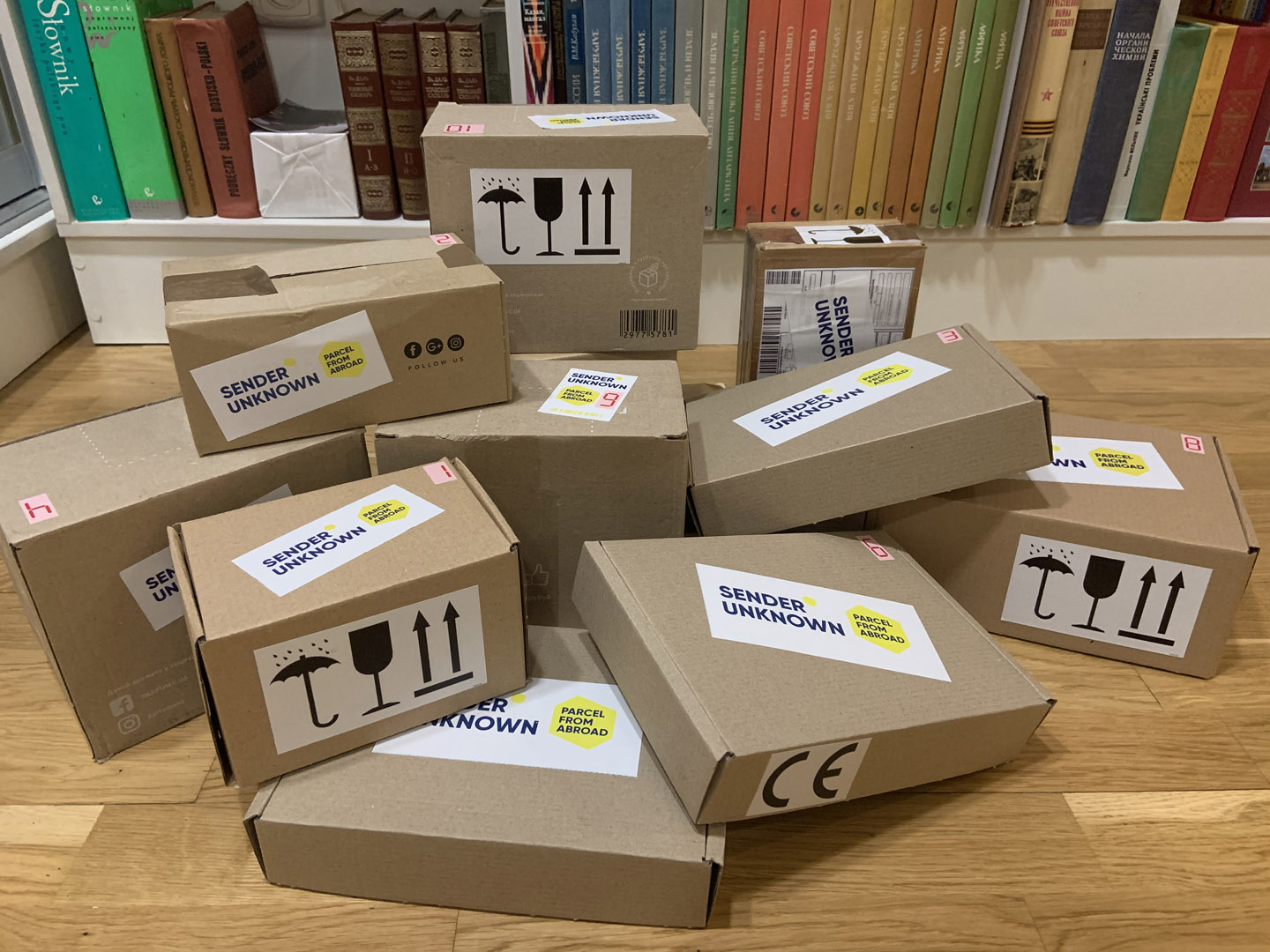
Tatiana Znachenko
A performance without actors, but not without characters.
An unusual performance "Sender Unknown", which premiered in Kiev, Nikolaev, Kherson and Kharkov in October 2020, is a series of life stories of people from different countries and cities. The play was created by three theater groups from Kherson (Totem), Cologne (Futur3) and Bishkek (Youth Theater Studio) Tatiana Znachenko A performance without actors, but not without characters.
An unusual performance "Sender Unknown", which premiered in Kiev, Nikolaev, Kherson and Kharkov in October 2020, is a series of life stories of people from different countries and cities. The play was created by three theater groups from Kherson (Totem), Cologne (Futur3) and Bishkek (Youth Theater Studio) as part of the Parcel from Abroad project with the support of the Goethe Institute, the Ministry of Culture of Rhine-Westphalia and the Ukrainian Cultural Foundation.
To their surprise, at the beginning of the performance, the viewers do not find the actors. In the course of the performance it becomes clear that the audience itself should become the characters. For a while, this may confuse the viewer, but later the roles are assigned themselves, which gives the performance a spontaneous character. Moreover, everyone has the opportunity to choose whether to become an active participant in the action or remain an observer.
The stories, which are read by participants in turn, pull them out of their familiar reality and make them think about the questions that the authors of the letters raise. Each letter encourages participants to reflect on the next situation and express their vision. And the fact that the events in the letters are authentic gives the discussion a livelier character. Gradually, the boundaries between the feelings of the letter writers and the personal experiences of the audience are blurring. Here you can sympathize with Rostislav from Crimea, who lost his job, admire Aigul, the housewife from Osh, who has a rare ability to find happiness in everyday things, and also want to take part in the difficult fate of an anonymous homeless man from Cologne. And now, in the course of the discussions, the personal experiences of the participants come to the fore, where surprise is replaced by indignation, and sadness is replaced by laughter. This is what makes this performance unpredictable. The directors managed to create such a performance that will unfold every time according to an unpredictable scenario. At the same time, there is still a certain structure in it.
The performance is organized in such a way that the participants do not get stuck in one story, but, intrigued by the content of other packages, rush to move on to the next letters. The objects that the participants find in each of the packages cause different reactions from "What should I do with this?" to "What delicious seeds!"
The final chord of the performance is the eternal question to which all the participants are trying to answer: "What is happiness for you?" At this stage, the participants have to look inside themselves and open up to others and, perhaps, even supplement the performance with their own life story.
Talking about the work of "Sender Unknown", it is not enough to talk about the artistic value only. A very unusual form should be noted here, which guarantees a new viewing experience for all the participants. as part of the Parcel from Abroad project with the support of the Goethe Institute, the Ministry of Culture of Rhine-Westphalia and the Ukrainian Cultural Foundation.
To their surprise, at the beginning of the performance, the viewers do not find the actors. In the course of the performance it becomes clear that the audience itself should become the characters. For a while, this may confuse the viewer, but later the roles are assigned themselves, which gives the performance a spontaneous character. Moreover, everyone has the opportunity to choose whether to become an active participant in the action or remain an observer. The stories, which are read by participants in turn, pull them out of their familiar reality and make them think about the questions that the authors of the letters raise. Each letter encourages participants to reflect on the next situation and express their vision. And the fact that the events in the letters are authentic gives the discussion a livelier character. Gradually, the boundaries between the feelings of the letter writers and the personal experiences of the audience are blurring. Here you can sympathize with Rostislav from Crimea, who lost his job, admire Aigul, the housewife from Osh, who has a rare ability to find happiness in everyday things, and also want to take part in the difficult fate of an anonymous homeless man from Cologne. And now, in the course of the discussions, the personal experiences of the participants come to the fore, where surprise is replaced by indignation, and sadness is replaced by laughter. This is what makes this performance unpredictable. The directors managed to create such a performance that will unfold every time according to an unpredictable scenario. At the same time, there is still a certain structure in it.
The performance is organized in such a way that the participants do not get stuck in one story, but, intrigued by the content of other packages, rush to move on to the next letters. The objects that the participants find in each of the packages cause different reactions from "What should I do with this?" to "What delicious seeds!"
The final chord of the performance is the eternal question to which all the participants are trying to answer: "What is happiness for you?" At this stage, the participants have to look inside themselves and open up to others and, perhaps, even supplement the performance with their own life story.
Talking about the work of "Sender Unknown", it is not enough to talk about the artistic value only. A very unusual form should be noted here, which guarantees a new viewing experience for all the participants.
"Sender unknown" – міжнародний проєкт, представлений Totem Centre Theatre Lab (Херсон), Futur3 (Кельн) і Молодіжною театральною студією (Бішкек). В ній глядач є також безпосереднім учасником. Першою сюжетною взаємодією у виставі (своєрідним першим актом) є комунікація глядача з кур'єром під час отримання посилки з невідомим вмістом. Це служить ключем для подальшої драматургії всередині зум-простору, де зустрічаються люди з різним досвідом і їм, по ходу подальшої взаємодії, доводиться відкривати для себе спочатку чужі наративи, а потім розкривати в тому чи іншому вигляді власні. Іноді ці наративи видаються наївно-щирими, але зараз і часи такі, коли "нова щирість" не здається чимось затертим. Але іноді вони самовикриваючі, вуайерістичні і ексбіціоністичні. Зум як простір театральної, партисипативної і перформативної взаємодії знижує фактор певної споконвічної авторської вибудуваності. Я / Ми – це драматурги, актори, судді і кати… Всі і ніхто.
"Sender unknown" викликає масу асоціацій з тим, як деякі актуальні європейські театральні діячі чи групи стали працювати з самим медіумом віртуальності як вимушеної в'язниці, лікарні або просто місця, куди нас кинули в ім'я порятунку здоров'я від палючого легені пекла коронавірусу. Можна згадати проєкт Штефана Кегі "9 movements" (Rimini Protokoll), де глядач запрошувався до участі у перформансі в жанрі site specific: там глядач сам був собі актором, драматургом, режисером, був як би частиною ієрархії і був над нею. "Sender unknown" володіє певною ієрархією на рівні зум-сесії з чітким порядком зачитування листів і рамкових ігор з предметами самими учасниками. Це дещо консервативний підхід, але тут варто уточнити головне – наш глядач ще не готовий до тотальної імерсивності до такої міри, щоб повністю позбутися цієї глибокої ієрархії.
Втім, "Sender unknown" характеризується не меншою часткою інтерактивності, ніж спектакль ізраїльських художників Ліора Залмансона і Маї Магнат "I don't want to see this». Хіба що замість тестів для майбутніх кандидатів в модератори Фейсбуку, як це було у Магнат-Залмансона – посилка як тригер, який розкриває фобії. Я, як безпосередній учасник сесії, вибрав для себе максимальну позицію відсторонення, спостерігача з боку, людини байдужої до загадкового вмісту посилки. (Мої особисті параноїдальні тригери зіграли тут свою визначальну роль.)
"Sender unknown" де-факто – це перший театральний проєкт, який вийшов з офлайну (прем'єра вистави була під час Gogolfest Dream в цьому році) в онлайн, не втративши нічого в плані наративного, хоча вибір героїв в листах і героїв для участі в зум-сесії здається як очевидним, так і чітко прорахованим, бо річ йде про апеляцію до надемпатії і сенситивного сприйняття Іншого – його досвіду, життя, особистості. Це дещо маніпулятивний, але достатньо ефективний хід, адже в умовах всесвітнього карантину всі ми повинні розділяти цей досвід Іншого, почавши проявляти на базових рівнях турботу про себе і оточуючих. Втім, цю перевірку наше суспільство (не тільки українське) провалило, побачивши у цих запобіжних заходах посягання на свої свободи. Однак посилка з невідомим вмістом – це ще й символ ящика Пандори, який, безумовно, для кожного свій.

Tatiana Znachenko
A performance without actors, but not without characters.
An unusual performance "Sender Unknown", which premiered in Kiev, Nikolaev, Kherson and Kharkov in October 2020, is a series of life stories of people from different countries and cities. The play was created by three theater groups from Kherson (Totem), Cologne (Futur3) and Bishkek (Youth Theater Studio) Tatiana Znachenko A performance without actors, but not without characters.
An unusual performance "Sender Unknown", which premiered in Kiev, Nikolaev, Kherson and Kharkov in October 2020, is a series of life stories of people from different countries and cities. The play was created by three theater groups from Kherson (Totem), Cologne (Futur3) and Bishkek (Youth Theater Studio) as part of the Parcel from Abroad project with the support of the Goethe Institute, the Ministry of Culture of Rhine-Westphalia and the Ukrainian Cultural Foundation.
To their surprise, at the beginning of the performance, the viewers do not find the actors. In the course of the performance it becomes clear that the audience itself should become the characters. For a while, this may confuse the viewer, but later the roles are assigned themselves, which gives the performance a spontaneous character. Moreover, everyone has the opportunity to choose whether to become an active participant in the action or remain an observer.
The stories, which are read by participants in turn, pull them out of their familiar reality and make them think about the questions that the authors of the letters raise. Each letter encourages participants to reflect on the next situation and express their vision. And the fact that the events in the letters are authentic gives the discussion a livelier character. Gradually, the boundaries between the feelings of the letter writers and the personal experiences of the audience are blurring. Here you can sympathize with Rostislav from Crimea, who lost his job, admire Aigul, the housewife from Osh, who has a rare ability to find happiness in everyday things, and also want to take part in the difficult fate of an anonymous homeless man from Cologne. And now, in the course of the discussions, the personal experiences of the participants come to the fore, where surprise is replaced by indignation, and sadness is replaced by laughter. This is what makes this performance unpredictable. The directors managed to create such a performance that will unfold every time according to an unpredictable scenario. At the same time, there is still a certain structure in it.
The performance is organized in such a way that the participants do not get stuck in one story, but, intrigued by the content of other packages, rush to move on to the next letters. The objects that the participants find in each of the packages cause different reactions from "What should I do with this?" to "What delicious seeds!"
The final chord of the performance is the eternal question to which all the participants are trying to answer: "What is happiness for you?" At this stage, the participants have to look inside themselves and open up to others and, perhaps, even supplement the performance with their own life story.
Talking about the work of "Sender Unknown", it is not enough to talk about the artistic value only. A very unusual form should be noted here, which guarantees a new viewing experience for all the participants. as part of the Parcel from Abroad project with the support of the Goethe Institute, the Ministry of Culture of Rhine-Westphalia and the Ukrainian Cultural Foundation.
To their surprise, at the beginning of the performance, the viewers do not find the actors. In the course of the performance it becomes clear that the audience itself should become the characters. For a while, this may confuse the viewer, but later the roles are assigned themselves, which gives the performance a spontaneous character. Moreover, everyone has the opportunity to choose whether to become an active participant in the action or remain an observer. The stories, which are read by participants in turn, pull them out of their familiar reality and make them think about the questions that the authors of the letters raise. Each letter encourages participants to reflect on the next situation and express their vision. And the fact that the events in the letters are authentic gives the discussion a livelier character. Gradually, the boundaries between the feelings of the letter writers and the personal experiences of the audience are blurring. Here you can sympathize with Rostislav from Crimea, who lost his job, admire Aigul, the housewife from Osh, who has a rare ability to find happiness in everyday things, and also want to take part in the difficult fate of an anonymous homeless man from Cologne. And now, in the course of the discussions, the personal experiences of the participants come to the fore, where surprise is replaced by indignation, and sadness is replaced by laughter. This is what makes this performance unpredictable. The directors managed to create such a performance that will unfold every time according to an unpredictable scenario. At the same time, there is still a certain structure in it.
The performance is organized in such a way that the participants do not get stuck in one story, but, intrigued by the content of other packages, rush to move on to the next letters. The objects that the participants find in each of the packages cause different reactions from "What should I do with this?" to "What delicious seeds!"
The final chord of the performance is the eternal question to which all the participants are trying to answer: "What is happiness for you?" At this stage, the participants have to look inside themselves and open up to others and, perhaps, even supplement the performance with their own life story.
Talking about the work of "Sender Unknown", it is not enough to talk about the artistic value only. A very unusual form should be noted here, which guarantees a new viewing experience for all the participants.
